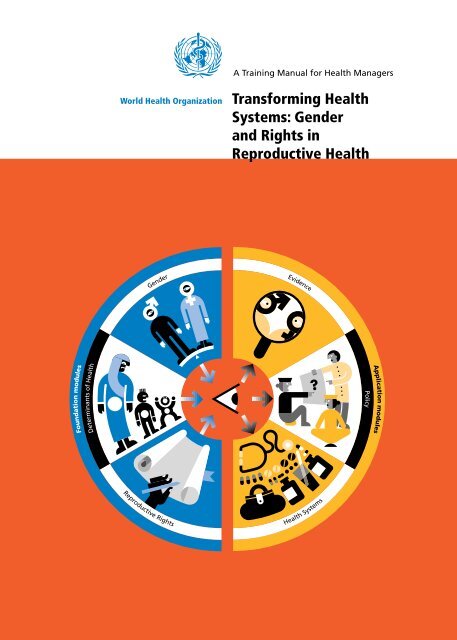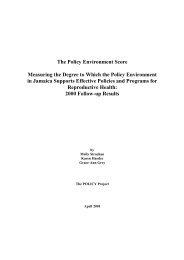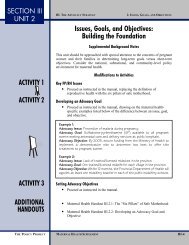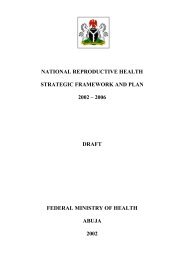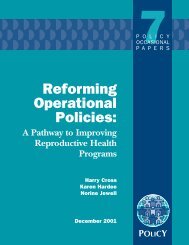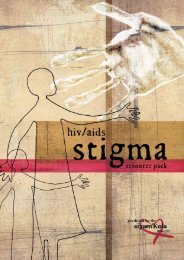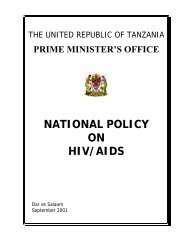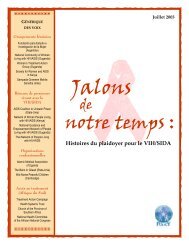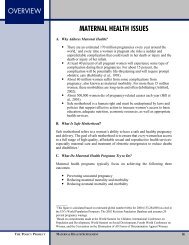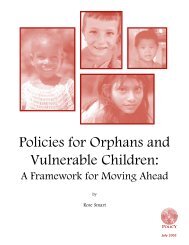Systems: Gender and Rights in Reproductive Health - POLICY Project
Systems: Gender and Rights in Reproductive Health - POLICY Project
Systems: Gender and Rights in Reproductive Health - POLICY Project
You also want an ePaper? Increase the reach of your titles
YUMPU automatically turns print PDFs into web optimized ePapers that Google loves.
A Tra<strong>in</strong><strong>in</strong>g Manual for <strong>Health</strong> Managers<br />
World <strong>Health</strong> Organization Transform<strong>in</strong>g <strong>Health</strong><br />
<strong>Systems</strong>: <strong>Gender</strong><br />
<strong>and</strong> <strong>Rights</strong> <strong>in</strong><br />
<strong>Reproductive</strong> <strong>Health</strong><br />
Foundation modules<br />
Determ<strong>in</strong>ants of <strong>Health</strong><br />
<strong>Reproductive</strong> <strong>Rights</strong><br />
<strong>Gender</strong><br />
<strong>Health</strong> <strong>Systems</strong><br />
Evidence<br />
Policy<br />
Application modules
In the com<strong>in</strong>g years, . . . programmes should<br />
exp<strong>and</strong> <strong>and</strong> upgrade formal <strong>and</strong> <strong>in</strong>formal tra<strong>in</strong><strong>in</strong>g <strong>in</strong><br />
sexual <strong>and</strong> reproductive health care <strong>and</strong> family<br />
plann<strong>in</strong>g.<br />
ICPD programme of Action, 1994, paragraph 7.23d<br />
Women are<br />
subject to particular<br />
health risks due to<br />
<strong>in</strong>adequate<br />
responsiveness <strong>and</strong><br />
lack of services to<br />
meet health needs<br />
related to sexuality<br />
<strong>and</strong> reproduction.<br />
These problems<br />
should be<br />
addressed.<br />
Beij<strong>in</strong>g Platform for Action, 1995, paragraph 97.<br />
<strong>Gender</strong> Equality<br />
Is the absence of discrim<strong>in</strong>ation<br />
on the basis of a person's sex <strong>in</strong><br />
opportunities <strong>and</strong> the allocation<br />
of resources or benefits or <strong>in</strong><br />
access to services.<br />
<strong>Gender</strong> Analysis<br />
Exam<strong>in</strong>es the differences <strong>in</strong> the<br />
roles that women <strong>and</strong> men play<br />
<strong>and</strong> the power balance <strong>in</strong> their<br />
relations. It exam<strong>in</strong>es how these<br />
differences determ<strong>in</strong>e differential<br />
exposure to risk, access to the<br />
benefits of technology,<br />
<strong>in</strong>formation, resources <strong>and</strong> health<br />
care, <strong>and</strong> the realisation of rights.<br />
Human <strong>Rights</strong><br />
Refer to an <strong>in</strong>ternationally agreed<br />
upon set of pr<strong>in</strong>ciples <strong>and</strong> norms<br />
conta<strong>in</strong>ed <strong>in</strong> treaties, declarations<br />
<strong>and</strong> recommendations at the<br />
<strong>in</strong>ternational <strong>and</strong> regional level.<br />
Governments have an obligation<br />
to respect, protect <strong>and</strong> fulfil<br />
human rights. In practical terms,<br />
<strong>in</strong>ternational human rights law is<br />
about def<strong>in</strong><strong>in</strong>g what governments<br />
can do to us, cannot do to us <strong>and</strong><br />
should do for us.<br />
Introduction<br />
The 1994 International Conference on Population <strong>and</strong><br />
Development <strong>in</strong> Cairo <strong>and</strong> the 1995 Fourth World Conference<br />
on Women <strong>in</strong> Beij<strong>in</strong>g declared that women’s empowerment <strong>and</strong><br />
reproductive rights are essential for the realisation of sexual<br />
<strong>and</strong> reproductive health. The curriculum Transform<strong>in</strong>g <strong>Health</strong><br />
<strong>Systems</strong>, <strong>Gender</strong> <strong>and</strong> <strong>Rights</strong> <strong>in</strong> <strong>Reproductive</strong> <strong>Health</strong> was created <strong>in</strong><br />
direct response to this call.<br />
<strong>Reproductive</strong> health exemplifies the complex <strong>in</strong>teraction<br />
between biologic differences between the sexes, <strong>and</strong> gender<br />
power differentials. Many of women’s reproductive health<br />
problems are not simply the result of their hav<strong>in</strong>g a womb or<br />
bear<strong>in</strong>g children.They are a consequence of discrim<strong>in</strong>ation <strong>and</strong><br />
lack of power to decide about how <strong>and</strong> with whom they will<br />
have sexual relations, <strong>and</strong> whether <strong>and</strong> when to bear children.<br />
For women, sexual <strong>and</strong> reproductive health are not just<br />
dependent on their own behaviour but, more fundamentally,<br />
they are dependent on the behaviour of their sexual partners,<br />
other family members <strong>and</strong> service providers.<br />
Therefore, <strong>in</strong> order to achieve improvements <strong>in</strong><br />
reproductive health, programmes <strong>and</strong> policies must promote<br />
gender equality <strong>and</strong> the realisation of sexual <strong>and</strong> reproductive<br />
rights for women.<br />
This course focuses on improv<strong>in</strong>g participants<br />
underst<strong>and</strong><strong>in</strong>g of gender <strong>and</strong> rights so that they can plan more<br />
effective programmes <strong>and</strong> services. It offers both conceptual<br />
<strong>and</strong> technical skills <strong>and</strong> tools for pactitioners to <strong>in</strong>tegrate the<br />
promotion of rights <strong>and</strong> gender equality <strong>in</strong>to their policies,<br />
plann<strong>in</strong>g <strong>and</strong> programmes.<br />
1
The most positive aspect of the whole<br />
<strong>in</strong>itiative process was be<strong>in</strong>g engaged <strong>in</strong> a<br />
collaborative <strong>in</strong>ternational effort to develop a<br />
new course which has enormous potential to<br />
br<strong>in</strong>g about positive change.<br />
Member of collaborat<strong>in</strong>g <strong>in</strong>stitution<br />
The Beg<strong>in</strong>n<strong>in</strong>gs<br />
In April 1996 a group of women from different parts of<br />
the world committed to women’s rights <strong>and</strong> reproductive<br />
<strong>and</strong> sexual health came together to review exist<strong>in</strong>g<br />
tra<strong>in</strong><strong>in</strong>g courses on reproductive health. They identified<br />
the need for a course which<br />
• <strong>in</strong>cludes a gender <strong>and</strong> human rights perspective<br />
• has a health systems orientation<br />
• is accessible to health mangers <strong>in</strong> develop<strong>in</strong>g <strong>and</strong><br />
developed countries.<br />
The result<strong>in</strong>g tra<strong>in</strong><strong>in</strong>g <strong>in</strong>itiative <strong>in</strong> gender <strong>and</strong><br />
reproductive health is a collaborative project of the<br />
• Harvard School of Public <strong>Health</strong>'s François Xavier<br />
Bagnoud Center for <strong>Health</strong> <strong>and</strong> Human <strong>Rights</strong>, USA<br />
• Women’s <strong>Health</strong> <strong>Project</strong> at the University of the<br />
Witwatersr<strong>and</strong>, South Africa<br />
• World <strong>Health</strong> Organization, Geneva, Switzerl<strong>and</strong>.<br />
The Initiative is run by a coord<strong>in</strong>at<strong>in</strong>g committee of<br />
<strong>in</strong>dividuals from the three <strong>in</strong>stitutions <strong>and</strong> three<br />
consultants who are experienced <strong>in</strong>ternational tra<strong>in</strong>ers <strong>in</strong><br />
gender <strong>and</strong> reproductive health issues. The Initiative is<br />
coord<strong>in</strong>ated by the Department of <strong>Reproductive</strong> <strong>Health</strong><br />
<strong>and</strong> Research of the World <strong>Health</strong> Organization.<br />
I consider the<br />
course the best so far<br />
out of all the courses I<br />
have attended.<br />
It really changes you<br />
personally <strong>and</strong><br />
enhances your work.<br />
South Africa<br />
The Process<br />
Transform<strong>in</strong>g <strong>Health</strong> <strong>Systems</strong>: <strong>Gender</strong> <strong>and</strong> <strong>Rights</strong> <strong>in</strong> <strong>Reproductive</strong><br />
<strong>Health</strong> is a curriculum for health managers that is the result<br />
of a four year test<strong>in</strong>g <strong>and</strong> adaptation process <strong>in</strong>volv<strong>in</strong>g<br />
strong collaboration with <strong>in</strong>stitutions <strong>in</strong> different parts of<br />
the world.<br />
• The draft core curriculum was pre-tested as a pilot<br />
course <strong>in</strong> Johannesburg, South Africa <strong>in</strong> August-<br />
September 1997 for 32 programme managers, policymakers<br />
<strong>and</strong> tra<strong>in</strong>ers from southern Africa<br />
• Four tra<strong>in</strong><strong>in</strong>g centres <strong>in</strong> Argent<strong>in</strong>a, Australia, Ch<strong>in</strong>a <strong>and</strong><br />
Kenya were selected from among 30 applicants to test<br />
the course.<br />
• To ensure that the curriculum offered by each of the<br />
selected centres was adapted appropriately a Regional<br />
Adaptation Workshop was held <strong>in</strong> November 1998.<br />
At this meet<strong>in</strong>g representatives from the tra<strong>in</strong><strong>in</strong>g centres<br />
<strong>and</strong> members of the coord<strong>in</strong>at<strong>in</strong>g committee discussed<br />
<strong>and</strong> developed ways to <strong>in</strong>tegrate regional issues <strong>in</strong>to the<br />
core curriculum.<br />
• Dur<strong>in</strong>g 1999, this course was offered by the four<br />
collaborat<strong>in</strong>g <strong>in</strong>stitutions<br />
• Centre for African Family Studies (CAFS), Nairobi,<br />
Kenya;<br />
• Centre for the Study of State <strong>and</strong> Society (CEDES),<br />
Buenos Aires, Argent<strong>in</strong>a;<br />
• Key Centre for Women’s <strong>Health</strong> <strong>in</strong> Society,<br />
University of Melbourne,Victoria,Australia;<br />
•<br />
Yunnan <strong>Reproductive</strong> <strong>Health</strong> Research Association<br />
(YRHRA), Kunm<strong>in</strong>g Medical College, Kunm<strong>in</strong>g,<br />
Ch<strong>in</strong>a.<br />
2<br />
3
• Pool<strong>in</strong>g their experience of runn<strong>in</strong>g the course,<br />
representatives from the different collaborat<strong>in</strong>g centres<br />
<strong>and</strong> the coord<strong>in</strong>at<strong>in</strong>g committee evaluated the course <strong>in</strong><br />
early 2000. New materials developed by the regional<br />
partners have been <strong>in</strong>corporated <strong>in</strong>to the curriculum,<br />
thereby <strong>in</strong>creas<strong>in</strong>g its usefulness to tra<strong>in</strong>ers <strong>in</strong> different<br />
regions of the world.<br />
• The revised core curriculum was aga<strong>in</strong> tested <strong>in</strong><br />
South Africa <strong>in</strong> September 2000 after which the<br />
curriculum was f<strong>in</strong>alised.<br />
• The curriculum will be published <strong>in</strong> 2001.<br />
Goals of this Initiative<br />
To build <strong>in</strong>stitutional capacity <strong>in</strong> tra<strong>in</strong><strong>in</strong>g<br />
centres around the world so that they can<br />
offer regionally-appropriate, high-quality<br />
tra<strong>in</strong><strong>in</strong>g <strong>in</strong> gender <strong>and</strong> reproductive health<br />
cover<strong>in</strong>g aspects of research, service-delivery<br />
<strong>and</strong> policy development.<br />
tra<strong>in</strong><strong>in</strong>g methods used<br />
• draw on participants’ exist<strong>in</strong>g<br />
knowledge<br />
• allow for participants to learn<br />
from each other <strong>and</strong> for facilitators<br />
to learn from participants<br />
• facilitate learn<strong>in</strong>g from experience<br />
• through this process enhance<br />
knowledge, skills <strong>and</strong> <strong>in</strong>sights<br />
This curriculum provides tra<strong>in</strong><strong>in</strong>g to health managers<br />
so they can<br />
Use <strong>and</strong> generate <strong>in</strong>formation<br />
Advocate <strong>and</strong> put <strong>in</strong> place policies<br />
• Design, implement <strong>and</strong> manage programmes<br />
for reproductive health services which are both<br />
gender sensitive <strong>and</strong> respectful of human rights<br />
The Curriculum<br />
The curriculum consists of six modules:<br />
<strong>Gender</strong><br />
Determ<strong>in</strong>ants of health<br />
<strong>Reproductive</strong> rights<br />
• Evidence<br />
• Policy<br />
<strong>Health</strong> <strong>Systems</strong><br />
The first three modules on gender, determ<strong>in</strong>ants of health <strong>and</strong><br />
reproductive rights provide the conceptual foundation of the<br />
course.These modules demonstrate the <strong>in</strong>terconnectedness of<br />
gender, rights <strong>and</strong> reproductive health issues with<strong>in</strong> the<br />
broader socio-economic <strong>and</strong> political context.<br />
In the last three modules, gender equity <strong>and</strong> human rights<br />
are applied to the collection, analysis <strong>and</strong> use of evidence, the<br />
formulation <strong>and</strong> promotion of policy, <strong>and</strong> the development of<br />
well function<strong>in</strong>g health systems.<br />
<strong>Reproductive</strong> health is the substantive focus of the course<br />
<strong>and</strong> forms the basis of all the case material, examples, <strong>and</strong><br />
exercises. Each module <strong>in</strong>cludes six or seven sessions some of<br />
which can be used to <strong>in</strong>troduce new technical developments<br />
or regional programmatic debates <strong>in</strong> reproductive health.<br />
To <strong>in</strong>crease the number of programme<br />
manager, planners, policy-makers <strong>and</strong><br />
tra<strong>in</strong>ers with both a gender perspective on<br />
reproductive health, <strong>and</strong> the technical<br />
skills needed to contribute to <strong>in</strong>creas<strong>in</strong>g<br />
access, quality <strong>and</strong> comprehensiveness of<br />
gender-sensitive reproductive health<br />
policies <strong>and</strong> programmes.<br />
5
I was concerned before start<strong>in</strong>g that it may not<br />
have been appropriate because of the level of power<br />
that I have <strong>and</strong> that I may not be able to <strong>in</strong>fluence<br />
policies, but that soon disappeared! It was challeng<strong>in</strong>g,<br />
<strong>and</strong> it clarified <strong>and</strong> built on my knowledge base.<br />
Australia<br />
The Tra<strong>in</strong><strong>in</strong>g Manual<br />
Course Structure<br />
The course clarified<br />
my thoughts <strong>and</strong> feel<strong>in</strong>gs<br />
<strong>and</strong> empowered me to<br />
verbalise my feel<strong>in</strong>gs. I<br />
am gender sensitive<br />
but not completely<br />
woman-focused. Both<br />
sexes have different<br />
needs <strong>and</strong> whilst there<br />
is <strong>in</strong>equality, we must<br />
respect that both sexes<br />
have rights.<br />
South Africa<br />
Transform<strong>in</strong>g <strong>Health</strong> <strong>Systems</strong>: <strong>Gender</strong> <strong>and</strong> <strong>Rights</strong> <strong>in</strong> <strong>Reproductive</strong><br />
<strong>Health</strong>, is divided <strong>in</strong>to two ma<strong>in</strong> sections. The first section<br />
conta<strong>in</strong>s a brief chapter on the people who the course is for,<br />
what it consists of <strong>and</strong> how it is run. The second section<br />
presents the teach<strong>in</strong>g material for each of the six modules.<br />
Each module <strong>in</strong>cludes:<br />
• The module brief, giv<strong>in</strong>g the objectives, rational, <strong>and</strong><br />
essential read<strong>in</strong>gs for the module, <strong>and</strong> a table outl<strong>in</strong><strong>in</strong>g<br />
the sessions conta<strong>in</strong>ed <strong>in</strong> that module;<br />
•<br />
Session guidel<strong>in</strong>es for each of the sessions, expla<strong>in</strong><strong>in</strong>g<br />
the objectives, methodology <strong>and</strong> detailed guidel<strong>in</strong>es on<br />
runn<strong>in</strong>g the session;<br />
• Lecture notes <strong>and</strong> h<strong>and</strong>outs for the various sessions<br />
<strong>in</strong>cluded <strong>in</strong> that module.<br />
This section also conta<strong>in</strong>s a detailed description of the<br />
open<strong>in</strong>g session, <strong>and</strong> of the conclud<strong>in</strong>g session which is<br />
structured so that participants are able to make l<strong>in</strong>kages across<br />
all the modules <strong>and</strong> consolidate what they have learnt dur<strong>in</strong>g<br />
the course.<br />
Several annexes <strong>in</strong>clude additional material useful to<br />
tra<strong>in</strong>ers <strong>and</strong> facilitators of the course.<br />
• Information resources, <strong>and</strong> where to access the read<strong>in</strong>gs<br />
mentioned <strong>in</strong> the modules<br />
Model timetable<br />
Assessment tools<br />
Resource list on participatory methods<br />
•<br />
A compilation of “ice-breakers” <strong>and</strong> “energiser” exercises<br />
for groups.<br />
The tra<strong>in</strong><strong>in</strong>g manual is the outcome of a process of<br />
susta<strong>in</strong>ed <strong>in</strong>teraction between a number of actors <strong>in</strong> different<br />
parts of the world. This has ensured that the content of this<br />
manual has undergone several iterations, modifications <strong>and</strong><br />
ref<strong>in</strong>ements to produce an end product that offers a<br />
comprehensive <strong>and</strong> <strong>in</strong>novative look at gender <strong>and</strong> rights <strong>in</strong><br />
reproductive health.<br />
Determ<strong>in</strong>ants of <strong>Health</strong><br />
<strong>Gender</strong><br />
<strong>Gender</strong><br />
This module lays the basis for underst<strong>and</strong><strong>in</strong>g how the<br />
comb<strong>in</strong>ation of biological differences <strong>and</strong> gender <strong>in</strong>equalities<br />
has an impact on the health of women <strong>and</strong> men, on their<br />
health seek<strong>in</strong>g behaviour <strong>and</strong> their access to health services.<br />
On completion of this module participants will be able to<br />
• underst<strong>and</strong> how gender is constructed, ma<strong>in</strong>ta<strong>in</strong>ed <strong>and</strong><br />
re<strong>in</strong>forced, <strong>and</strong> the difference between sex <strong>and</strong> gender;<br />
• underst<strong>and</strong> how norms <strong>and</strong> values about gender roles are<br />
related to gender based <strong>in</strong>equalities <strong>in</strong> workloads, <strong>in</strong> access to<br />
education, control over economic resources <strong>and</strong> power;<br />
• have the skills to apply gender analysis to specific health<br />
conditions, to underst<strong>and</strong> how gender impacts on<br />
health status.<br />
Determ<strong>in</strong>ants of health<br />
This module exam<strong>in</strong>es the broad socio-political <strong>and</strong> economic<br />
context with<strong>in</strong> which health must be understood. It presents a<br />
framework for analys<strong>in</strong>g the social construction of health <strong>and</strong><br />
illness at household, community, national <strong>and</strong> <strong>in</strong>ternational levels.<br />
On completion of this module participants will be able to<br />
• apply a social determ<strong>in</strong>ants framework to the analysis of<br />
health;<br />
• identify the factors affect<strong>in</strong>g women’ health as they relate<br />
to their social <strong>and</strong> economic status <strong>and</strong> as they relate to men;<br />
• underst<strong>and</strong> the various levels at which health determ<strong>in</strong>ants<br />
operate, <strong>and</strong> how these levels <strong>in</strong>terrelate;<br />
• ga<strong>in</strong> an <strong>in</strong>sight <strong>in</strong>to how such analysis can shape <strong>and</strong><br />
<strong>in</strong>form policies <strong>and</strong> <strong>in</strong>terventions <strong>and</strong> to become aware of<br />
the structural factors underly<strong>in</strong>g the impact or success of<br />
policies <strong>and</strong> programmes.<br />
6<br />
7
<strong>Reproductive</strong> <strong>Rights</strong><br />
This module aims to provide participants with the knowledge<br />
about basic concepts of rights; participants learn to appreciate<br />
ways <strong>in</strong> which unequal gender power relations underlie the denial<br />
of women’s reproductive <strong>and</strong> sexual rights <strong>in</strong> different sett<strong>in</strong>gs.<br />
At the end of the module, participants will be able to<br />
• state the basic concepts of rights, <strong>in</strong>clud<strong>in</strong>g reproductive<br />
<strong>and</strong> sexual rights;<br />
• underst<strong>and</strong> the ways <strong>in</strong> which rights are def<strong>in</strong>ed <strong>in</strong><br />
<strong>in</strong>ternational human rights documents <strong>and</strong> how they are<br />
used by various actors;<br />
• identify <strong>and</strong> describe the <strong>in</strong>stitutions which are<br />
promot<strong>in</strong>g, monitor<strong>in</strong>g, implement<strong>in</strong>g <strong>and</strong> enforc<strong>in</strong>g<br />
human rights norms relevant to reproductive health;<br />
• apply a reproductive <strong>and</strong> sexual rights approach to<br />
research, <strong>in</strong>terventions, service delivery <strong>and</strong> policy<br />
development;<br />
• conceptualise <strong>and</strong> apply a reproductive rights model to<br />
concrete examples<br />
Evidence<br />
This module promotes the effective use of exist<strong>in</strong>g data <strong>and</strong><br />
of data monitor<strong>in</strong>g systems to improve gender equity <strong>and</strong><br />
reproductive health policies <strong>and</strong> programmes.<br />
The new perspectives<br />
<strong>and</strong> new methods learned<br />
<strong>in</strong> the module on determ<strong>in</strong>ants<br />
of health can<br />
greatly help the obta<strong>in</strong><strong>in</strong>g<br />
of real <strong>and</strong> objective<br />
research results.<br />
Ch<strong>in</strong>a<br />
<strong>Reproductive</strong> <strong>Rights</strong><br />
Policy<br />
Policy<br />
This module equips participants with the tools to underst<strong>and</strong><br />
<strong>and</strong> monitor the policy environment with<strong>in</strong> the larger social,<br />
economic <strong>and</strong> political context. It also illustrates how gendersensitive<br />
<strong>in</strong>formation is essential for rational policy development<br />
as well as service plann<strong>in</strong>g.<br />
At the end of the module, participants will be able to<br />
• conceptualise the policy-mak<strong>in</strong>g process <strong>in</strong>clud<strong>in</strong>g the<br />
range of factors which <strong>in</strong>fluence policy decisions <strong>and</strong><br />
policy implementation at various levels;<br />
• identify the components of strategy design/plann<strong>in</strong>g for<br />
policy changes;<br />
• identify <strong>and</strong> address gender <strong>in</strong>equality <strong>in</strong> policies <strong>and</strong><br />
programmes;<br />
• use <strong>in</strong>ternational agreements for motivat<strong>in</strong>g changes <strong>in</strong><br />
policy or implementation;<br />
•<br />
use specific tools to analyze policy mak<strong>in</strong>g processes <strong>and</strong><br />
design <strong>in</strong>tervention strategies to impact on current<br />
policies or programmes;<br />
<strong>Health</strong> <strong>Systems</strong><br />
This module demonstrates how the organization <strong>and</strong><br />
function<strong>in</strong>g of health systems impact differently on women<br />
<strong>and</strong> men, often to the disadvantage of women, <strong>and</strong> how to<br />
address this.<br />
At the end of the module, participants will have<br />
• an overview of different types of evidence useful to<br />
health managers <strong>and</strong> policy makers;<br />
• the capacity to recognise the ma<strong>in</strong> forms of bias, particularly<br />
gender bias <strong>in</strong> research design, implementation <strong>and</strong> analysis;<br />
• the ability to locate, analyse <strong>and</strong> use different types of<br />
<strong>in</strong>formation to promote gender sensitive reproductive<br />
health services;<br />
• the capacity to develop <strong>in</strong>dicators for monitor<strong>in</strong>g <strong>and</strong><br />
assess<strong>in</strong>g gender equity <strong>in</strong> this area.<br />
Evidence<br />
<strong>Health</strong> <strong>Systems</strong><br />
This course affirmed<br />
my belief that gender<br />
<strong>in</strong>equality exists, <strong>and</strong><br />
made me realise that<br />
there is someth<strong>in</strong>g that<br />
we can do about it.<br />
Australia<br />
At the end of the module, participants will be able to<br />
• underst<strong>and</strong> the impact of the macroeconomic<br />
environment <strong>and</strong> health f<strong>in</strong>anc<strong>in</strong>g on the organisation of<br />
health care services;<br />
• underst<strong>and</strong> the <strong>in</strong>terrelationship between the components<br />
of a well-function<strong>in</strong>g health system;<br />
• use methodologies for gender-sensitive plann<strong>in</strong>g <strong>and</strong><br />
manag<strong>in</strong>g health systems change;<br />
• apply the tools learned throughout the course to a<br />
health systems issue affect<strong>in</strong>g reproductive health<br />
Current debates <strong>in</strong> <strong>Reproductive</strong> health<br />
In addition to the six module, the course schedule has room<br />
for special sessions <strong>and</strong> guest lectures on current debates <strong>in</strong><br />
reproductive health of relevance to the country/region where<br />
the course is held.<br />
8<br />
9
The course gave a wide perspective<br />
of gender through use of <strong>in</strong>terest<strong>in</strong>g<br />
<strong>and</strong> participatory methodology that<br />
held <strong>in</strong>terest throughout the course.<br />
Australia<br />
This course has empowered <strong>and</strong><br />
given me the practical advocacy skills to<br />
try <strong>and</strong> change policies <strong>in</strong> the<br />
Obstetrics <strong>and</strong> Gynaecology Department<br />
of our Hospital.<br />
Kenya<br />
Regional Collaborat<strong>in</strong>g Institutions<br />
The International Coord<strong>in</strong>at<strong>in</strong>g Committee<br />
Centre for African Family Studies (CAFS), with<br />
headquarters <strong>in</strong> Nairobi (Kenya) <strong>and</strong> regional offices<br />
<strong>in</strong> Lome (Togo). Founded <strong>in</strong> 1975, CAFS is an African<br />
regional <strong>in</strong>stitution dedicated to strengthen<strong>in</strong>g the<br />
capabilities of organizations work<strong>in</strong>g <strong>in</strong> sexual <strong>and</strong><br />
reproductive health throughout sub-Saharan Africa.<br />
Serv<strong>in</strong>g both Anglophone <strong>and</strong> Francophone Africa,<br />
CAFS provides management <strong>and</strong> technical tra<strong>in</strong><strong>in</strong>g <strong>in</strong><br />
sexual <strong>and</strong> reproductive health throughout sub-<br />
Saharan Africa, <strong>and</strong> has been an <strong>in</strong>ternational leader<br />
<strong>in</strong> the translation of gender <strong>and</strong> reproductive rights<br />
perspectives <strong>in</strong>to the realities of service delivery.<br />
Centre for the Study of State <strong>and</strong> Society<br />
(CEDES), established <strong>in</strong> 1975 <strong>in</strong> Buenos Aires,<br />
Argent<strong>in</strong>a, is a lead<strong>in</strong>g social science research<br />
centre dedicated to basic, <strong>and</strong> applied research,<br />
post-graduate tra<strong>in</strong><strong>in</strong>g of social scientists, <strong>and</strong><br />
technical assistance. In 1993, the <strong>Health</strong>, Economy<br />
<strong>and</strong> Society Department <strong>in</strong>itiated the Regional<br />
Program on Social Research, Tra<strong>in</strong><strong>in</strong>g <strong>and</strong> Technical<br />
Assistance on <strong>Reproductive</strong> <strong>Health</strong> <strong>and</strong> Sexuality for<br />
Argent<strong>in</strong>a, Chile, Peru, <strong>and</strong> Columbia. This Program<br />
has s<strong>in</strong>ce sponsored national <strong>and</strong> regional tra<strong>in</strong><strong>in</strong>g<br />
workshops throughout Lat<strong>in</strong> America, a Resident<br />
Fellows Regional Program, <strong>and</strong> most recently, a<br />
Master Program on Social Science <strong>and</strong> <strong>Health</strong> <strong>in</strong><br />
collaboration with the Facultad Lat<strong>in</strong>o-americana de<br />
Ciencias Sociales (FLACSO-Argent<strong>in</strong>a)<br />
Key Centre for Women's <strong>Health</strong> <strong>in</strong> Society,<br />
University of Melbourne, Victoria, Australia was established<br />
<strong>in</strong> 1988. It is a multi-discipl<strong>in</strong>ary research <strong>and</strong><br />
teach<strong>in</strong>g <strong>in</strong>stitution <strong>in</strong> the Faculty of Medic<strong>in</strong>e,<br />
Dentistry <strong>and</strong> <strong>Health</strong> Sciences, <strong>and</strong> was an<br />
<strong>in</strong>ternational forerunner <strong>in</strong> the development of postgraduate<br />
course <strong>in</strong> women's health. In 1993 the<br />
Centre became a WHO Regional Collaborat<strong>in</strong>g Centre<br />
for Women's <strong>Health</strong>. As part of their WHO m<strong>and</strong>ate,<br />
they <strong>in</strong>itiated a regional Network <strong>in</strong> Women's <strong>Health</strong>,<br />
exp<strong>and</strong><strong>in</strong>g their tra<strong>in</strong><strong>in</strong>g activities <strong>in</strong>to Vietnam,<br />
Pakistan, <strong>and</strong> Fiji, <strong>and</strong> establish<strong>in</strong>g collaborative<br />
research <strong>and</strong> <strong>in</strong>stitutional l<strong>in</strong>kages with Indonesia, the<br />
Philipp<strong>in</strong>es, Thail<strong>and</strong>, Vietnam, <strong>and</strong> the South Pacific.<br />
Yunnan <strong>Reproductive</strong> <strong>Health</strong> Research Association<br />
(YRHRA), Kunm<strong>in</strong>g, Ch<strong>in</strong>a, was founded <strong>in</strong><br />
1994. It was the first NGO established <strong>in</strong> Ch<strong>in</strong>a to<br />
promote multi-discipl<strong>in</strong>ary reproductive health<br />
research <strong>and</strong> tra<strong>in</strong><strong>in</strong>g, <strong>and</strong> to raise public awareness of<br />
reproductive health based on a woman-centred <strong>and</strong><br />
community-based approach. YRHRA faculty represent<br />
more than 30 <strong>in</strong>stitutions <strong>in</strong> Ch<strong>in</strong>a, <strong>and</strong> have a close<br />
relationship with academic <strong>in</strong>stitutions <strong>and</strong> NGOs <strong>in</strong><br />
neighbour<strong>in</strong>g countries such as Thail<strong>and</strong>. YRHRA<br />
sponsors reproductive health courses <strong>and</strong> workshops<br />
with<strong>in</strong> Ch<strong>in</strong>a, with participants from neighbour<strong>in</strong>g<br />
Asian countries, for both NGOs <strong>and</strong> government family<br />
plann<strong>in</strong>g <strong>and</strong> maternal <strong>and</strong> child health <strong>in</strong>stitutions.<br />
Jane Cott<strong>in</strong>gham, BA, MSc, is Technical Officer for<br />
Women’s Perspectives <strong>and</strong> <strong>Gender</strong> Issues at the<br />
Department of <strong>Reproductive</strong> <strong>Health</strong> <strong>and</strong> Research of the<br />
World <strong>Health</strong> Organization <strong>in</strong> Geneva. She works with<br />
women’s health groups, policy-makers <strong>and</strong> scientists to<br />
ensure that women’s rights <strong>and</strong> gender perspectives are<br />
<strong>in</strong>tegrated <strong>in</strong>to the reproductive health research agenda.<br />
In 1976 she co-founded ISIS Women’s International<br />
Information <strong>and</strong> Communication Service. Dur<strong>in</strong>g her 11<br />
years as Director of ISIS, she helped to create an<br />
<strong>in</strong>ternational women’s <strong>in</strong>formation network <strong>and</strong> coauthored<br />
<strong>and</strong> edited numerous publications on women’s<br />
issues. Ms Cott<strong>in</strong>gham received a Masters <strong>in</strong> Population<br />
Sciences from Harvard School of Public <strong>Health</strong> <strong>in</strong> 1991.<br />
Sharon Fonn, MD, PhD, FFCH, is a medical doctor<br />
with a PhD <strong>in</strong> community health focuss<strong>in</strong>g on<br />
occupational epidemiology, <strong>and</strong> a public health<br />
specialist. She is the Director of Research at the Womenıs<br />
<strong>Health</strong> <strong>Project</strong> <strong>in</strong> Johannesberg <strong>and</strong> is an Associate<br />
Professor <strong>in</strong> the School of Public <strong>Health</strong> at the University<br />
of the Witwatersr<strong>and</strong>. Dr Fonn has worked extensively <strong>in</strong><br />
<strong>and</strong> with the public health care system <strong>in</strong> South Africa.<br />
She has also <strong>in</strong>itiated <strong>and</strong> been <strong>in</strong>volved <strong>in</strong> research on<br />
the function<strong>in</strong>g of health services <strong>and</strong> womenıs access to<br />
health services <strong>and</strong> health related behaviour <strong>in</strong> Africa,<br />
<strong>and</strong> has worked for many years on cervical cancer. Dr<br />
Fonn has been <strong>in</strong>volved with numerous <strong>in</strong>ternational<br />
agencies work<strong>in</strong>g on gender <strong>and</strong> health research, tak<strong>in</strong>g<br />
account of gender relations <strong>in</strong> health policy <strong>and</strong><br />
programmes, <strong>and</strong> develop<strong>in</strong>g tra<strong>in</strong><strong>in</strong>g materials <strong>and</strong><br />
runn<strong>in</strong>g tra<strong>in</strong><strong>in</strong>g courses on how to promote gender<br />
equity <strong>in</strong> health programm<strong>in</strong>g <strong>and</strong> service delivery.<br />
Claudia Garcia Moreno, MD, MCM. For the<br />
last 10 years Dr. Garcia Moreno’s work has focused<br />
on women’s health, <strong>in</strong>clud<strong>in</strong>g reproductive health,<br />
<strong>and</strong> on gender <strong>and</strong> health. She participated <strong>in</strong> the<br />
negotiations on reproductive health <strong>and</strong> rights at<br />
the International Conference on Population <strong>and</strong><br />
Development <strong>in</strong> Cairo (1994), the Social Summit<br />
(1995) <strong>and</strong> the Fourth World Conference on<br />
Women <strong>in</strong> Beij<strong>in</strong>g (1995). She was Chief of<br />
Women’s <strong>Health</strong> <strong>in</strong> the World <strong>Health</strong> Organization<br />
from 1994-1998 <strong>and</strong> now works <strong>in</strong> the Global<br />
Programme on Evidence for <strong>Health</strong> Policy where<br />
her primary responsibilities <strong>in</strong>clude ma<strong>in</strong>stream<strong>in</strong>g<br />
gender <strong>in</strong> WHO, <strong>and</strong> violence aga<strong>in</strong>st women. She<br />
co-ord<strong>in</strong>ates a Multi-country Study on Women’s<br />
<strong>Health</strong> <strong>and</strong> Domestic Violence Aga<strong>in</strong>st Women<br />
be<strong>in</strong>g conducted <strong>in</strong> 7 countries.<br />
Sofia Grusk<strong>in</strong>, JD, MIA, is the Director of the<br />
International <strong>Health</strong> <strong>and</strong> Human <strong>Rights</strong> Program at<br />
the François-Xavier Bagnoud Center for <strong>Health</strong> <strong>and</strong><br />
Human <strong>Rights</strong> <strong>and</strong> Assistant Professor <strong>in</strong> Population<br />
<strong>and</strong> International <strong>Health</strong> at the Harvard School of<br />
Public <strong>Health</strong>. The emphasis of her work is on the<br />
policy <strong>and</strong> practice implications of l<strong>in</strong>k<strong>in</strong>g rights to<br />
health. Ms Grusk<strong>in</strong> currently serves as an advisor to<br />
both UNAIDS <strong>and</strong> WHO, is a Board Member of<br />
Amnesty International USA <strong>and</strong> a found<strong>in</strong>g member<br />
of The Consortium for <strong>Health</strong> <strong>and</strong> Human <strong>Rights</strong>.<br />
She is the Editor of the International Journal of<br />
<strong>Health</strong> <strong>and</strong> Human <strong>Rights</strong>, <strong>and</strong> has authored<br />
numerous chapters <strong>and</strong> articles on issues relat<strong>in</strong>g<br />
to health <strong>and</strong> human rights.<br />
10<br />
11
Barbara Klugman, MA, is Director of the Women’s<br />
<strong>Health</strong> <strong>Project</strong> <strong>in</strong> Johannesburg, South Africa. She<br />
was chairperson of the core group appo<strong>in</strong>ted by the<br />
M<strong>in</strong>istry of Welfare <strong>in</strong> South Africa to develop a new<br />
population policy for the post-apartheid government,<br />
<strong>and</strong> was responsible for the development of a Green<br />
paper <strong>and</strong> a draft White paper on this topic. She was<br />
<strong>in</strong> the South African government delegations to Cairo<br />
<strong>and</strong> Beij<strong>in</strong>g, responsible for negotiations on health.<br />
She has published widely on population policy, sexual<br />
<strong>and</strong> reproductive <strong>and</strong> women’s health, gender <strong>and</strong><br />
women’s rights. She is a member of the Editorial<br />
Advisory Committee of <strong>Reproductive</strong> <strong>Health</strong> Matters<br />
<strong>and</strong> the Essential National <strong>Health</strong> Committee of the<br />
South African Department of <strong>Health</strong>. She is currently<br />
work<strong>in</strong>g on national <strong>and</strong> <strong>in</strong>ternational policy <strong>and</strong><br />
tra<strong>in</strong><strong>in</strong>g <strong>in</strong>itiatives to ma<strong>in</strong>stream gender <strong>in</strong> health.<br />
Adel<strong>in</strong>a Ndeto Mwau, MA, is currently Executive<br />
Director of the Women’s Resource Centre (Kenya) as<br />
well as founder <strong>and</strong> steer<strong>in</strong>g committee member of<br />
the Coalition on Violence Aga<strong>in</strong>st Women (COVAW).<br />
From 1994 to 1997 she was the East Africa<br />
programme officer for Women <strong>in</strong> Law <strong>and</strong><br />
Development <strong>in</strong> Africa (WiLDAF) where she worked<br />
to strengthen the capacity of women's rights NGOs<br />
throughout Eastern Africa. Prior to that she had<br />
worked for six years as gender programme officer for<br />
Oxfam, Kenya. She is the co-author of the Oxfam<br />
<strong>Gender</strong> Tra<strong>in</strong><strong>in</strong>g Manual. Ms Mwau is currently one<br />
of the 21 commissioners nom<strong>in</strong>ated by all religious<br />
groups <strong>and</strong> civil society organisations to review the<br />
Constitution of Kenya.<br />
Sundari Rav<strong>in</strong>dran, PhD is an economist with<br />
extensive research experience <strong>in</strong> women’s health <strong>and</strong><br />
development. She is currently Honorary Professor at<br />
the Achutha Menon Centre for <strong>Health</strong> Science<br />
Studies, Kerala, India, <strong>and</strong> teaches courses on gender<br />
issues <strong>in</strong> health <strong>and</strong> health <strong>and</strong> development as part<br />
of their MPH Programme. She is also Honorary<br />
Executive Director of the Rural Women’s Social<br />
Education Centre, Tamil Nadu, India, a grassroots<br />
women’s organisation. Formerly co-editor of <strong>Reproductive</strong><br />
<strong>Health</strong> Matters, Dr Rav<strong>in</strong>dran has published<br />
extensively on various aspects of women’s social<br />
development, <strong>and</strong> on the l<strong>in</strong>kages between gender,<br />
development <strong>and</strong> health.<br />
Rachel Snow, ScD is Unit Head for <strong>Reproductive</strong><br />
<strong>Health</strong> at the Institute for Tropical Hygiene <strong>and</strong> Public<br />
<strong>Health</strong>, University of Heidelberg Medical School,<br />
Germany. She has been teach<strong>in</strong>g <strong>in</strong>ternational<br />
reproductive health courses for over 10 years, at<br />
Harvard, the University of Heidelberg, <strong>and</strong><br />
<strong>in</strong>ternationally. She co-teaches the advanced module <strong>in</strong><br />
<strong>Reproductive</strong> <strong>Health</strong> for Trop-Ed-Europe, a European<br />
Masters Program <strong>in</strong> International Heath. Her research<br />
focuses on improv<strong>in</strong>g measurement of the reproductive<br />
health burden <strong>in</strong> poor countries, improv<strong>in</strong>g delivery of<br />
appropriate contraceptive <strong>and</strong> diagnostic technologies,<br />
<strong>and</strong> wider application of a gender analysis <strong>in</strong> health. She<br />
is a found<strong>in</strong>g editor of The African Journal of<br />
<strong>Reproductive</strong> <strong>Health</strong>.<br />
Makhosazana Xaba, RN, RM, B.Cur E et A, is<br />
currently the Country Representative for Ipas-South<br />
Africa based <strong>in</strong> Johannesburg. In 1991 she cofounded<br />
the Women’s <strong>Health</strong> <strong>Project</strong> <strong>and</strong> worked<br />
there for n<strong>in</strong>e years. From 1996 to 2000 she was the<br />
Director of Tra<strong>in</strong><strong>in</strong>g <strong>and</strong> Capacity Build<strong>in</strong>g. She has<br />
experience as a nurse <strong>and</strong> midwife, a health systems<br />
researcher <strong>and</strong> a gender tra<strong>in</strong>er, <strong>and</strong> has published<br />
on women's health <strong>and</strong> quality of care. She is the cochair<br />
of the <strong>Gender</strong> Advisory Panel of the Department<br />
of <strong>Reproductive</strong> <strong>Health</strong> <strong>and</strong> Research <strong>in</strong> WHO. Ms<br />
Xaba was an anti-apartheid activist <strong>and</strong>, while <strong>in</strong><br />
exile, obta<strong>in</strong>ed a diploma <strong>in</strong> Journalism <strong>in</strong> Berl<strong>in</strong>,<br />
Germany, <strong>and</strong> subsequently worked as a radio<br />
journalist <strong>in</strong> Zambia.<br />
I’m better able<br />
to operationalise<br />
the gender<br />
approach to<br />
reproductive health,<br />
conduct better<br />
policy analysis <strong>and</strong><br />
advocacy, <strong>and</strong> am<br />
more confident <strong>in</strong><br />
address<strong>in</strong>g gender<br />
disparities.<br />
Participant at the pilot course <strong>in</strong> South Africa, 1997<br />
12
Department of <strong>Reproductive</strong> <strong>Health</strong> & Research<br />
World <strong>Health</strong> Organization<br />
20 avenue Appia<br />
CH-1211 Geneva 27<br />
Switzerl<strong>and</strong><br />
Phone: +41-22-791-4213<br />
Fax: +41-22-791-4171<br />
E-mail: rhrpublications@who.<strong>in</strong>t<br />
Website: http://www.who.<strong>in</strong>t/reproductive-health/


